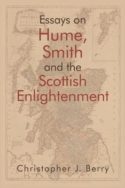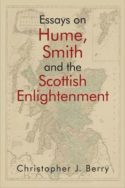
ABOUT THIS BOOK
PUBLISHER: Edinburgh University Press
FORMAT: Hardback
ISBN: 9780748645329
RRP: £70.00
PAGES: 216
PUBLICATION DATE:
July 31, 2013
BUY THIS BOOK
As an Amazon Associate and Bookshop.org affiliate we earn from qualifying purchases.
The Idea of Commercial Society in the Scottish Enlightenment
Christopher J. Berry
This is the first exposition of how Enlightenment thinkers viewed this idea that shapes the world today. The Scottish Enlightenment was the first intellectual movement to view commercial society as a distinct and distinctive social formation – one that still shapes our everyday lives. Christopher Berry explains why Enlightenment thinkers considered commercial society to be wealthier and freer than earlier forms, and charts the arguments Scottish philosophers put forward for and against the idea. This is the first book to focus on the Scottish Enlightenment’s conception of commercial society, revealing it to be the movement’s core idea. It analyses key works like Adam Smith’s Wealth of Nations, David Hume’s Essays and Treatises on Several Subjects and Adam Ferguson’s Essay on the History of Civil Society. It looks at lesser-known works such as Robert Wallace’s Dissertation on Numbers of Mankind.
Reviews of The Idea of Commercial Society in the Scottish Enlightenment
"The revolution of the Scottish enlightenment was to inform the emergence of free trade zones, global markets and the financial system that underpins modern capitalism. Berry's account of this shift in understanding is nuanced and informed, and makes some significant contributions to the literature."–Michael P. Brown, University of Aberdeen, The Scottish Historical Review
Christopher J. Berry
Christopher J. Berry is Professor Emeritus of Political Theory at Glasgow University, which he joined from 1970, from the LSE where he completed his doctorate. He is best known for his work on the Scottish Enlightenment and on the ‘Idea of Luxury’. He has given invited keynote lectures on these themes in China, Japan, Chile, the US and in Europe. He is an elected Fellow of the Royal Society of Edinburgh.












